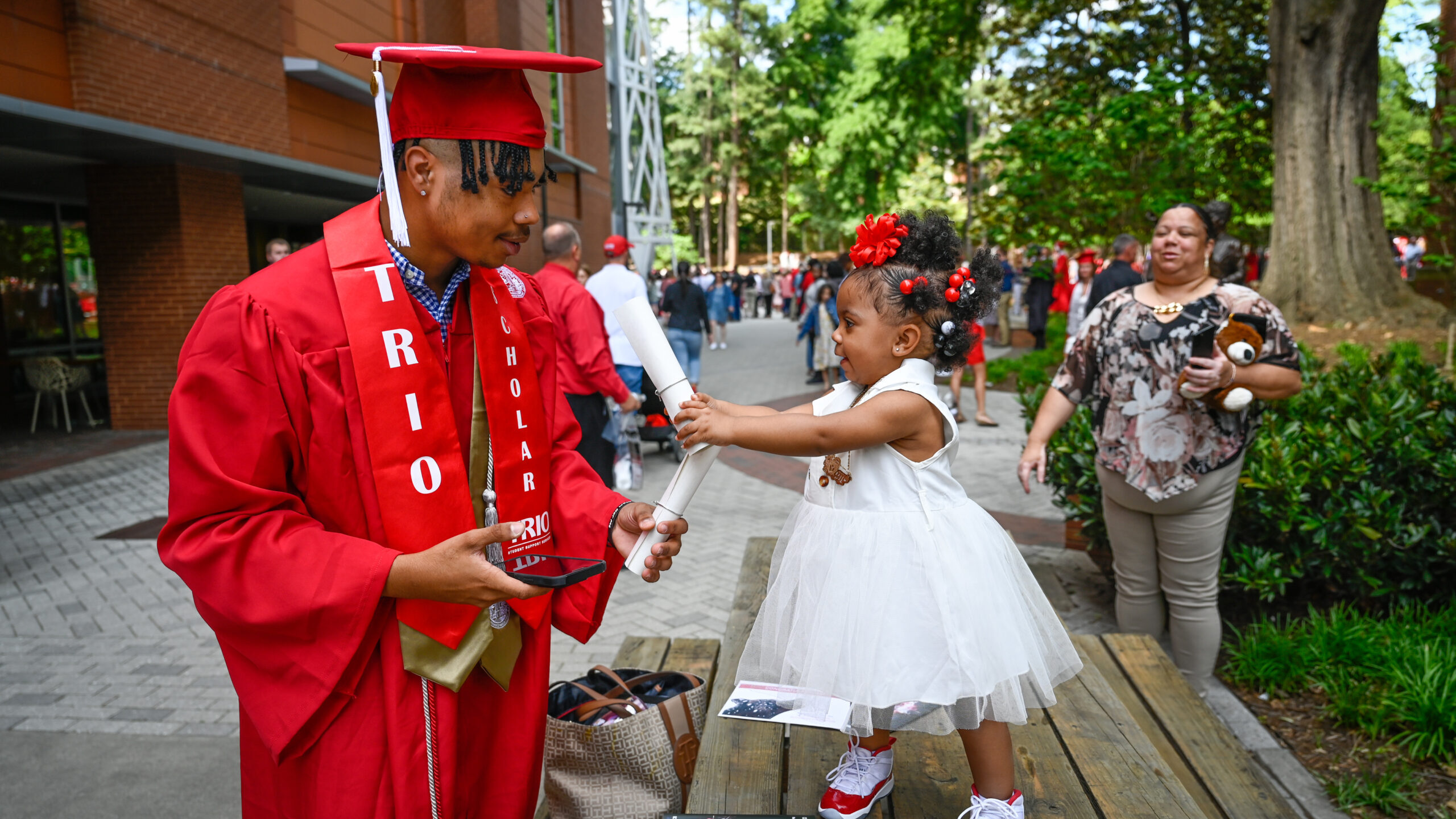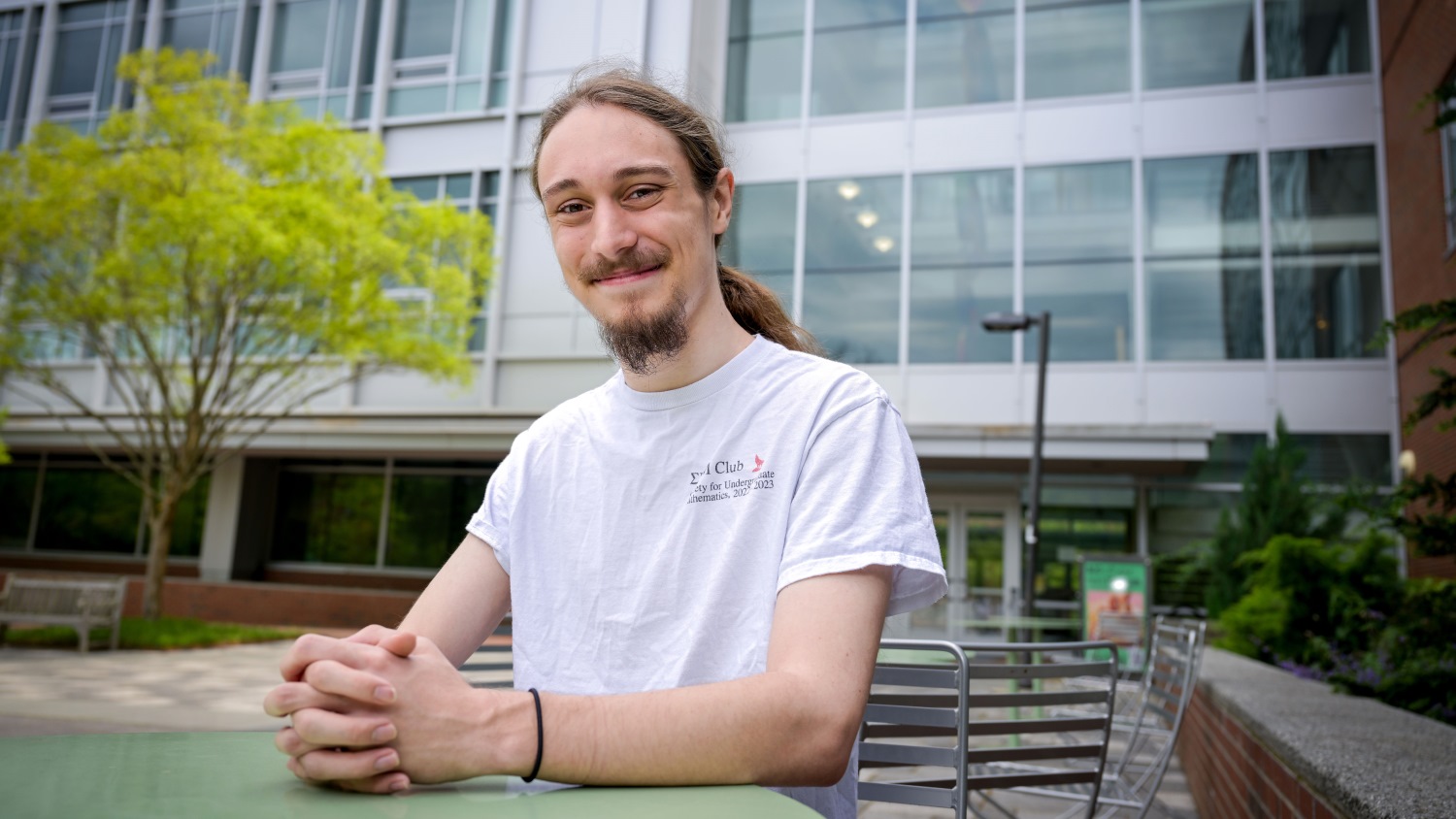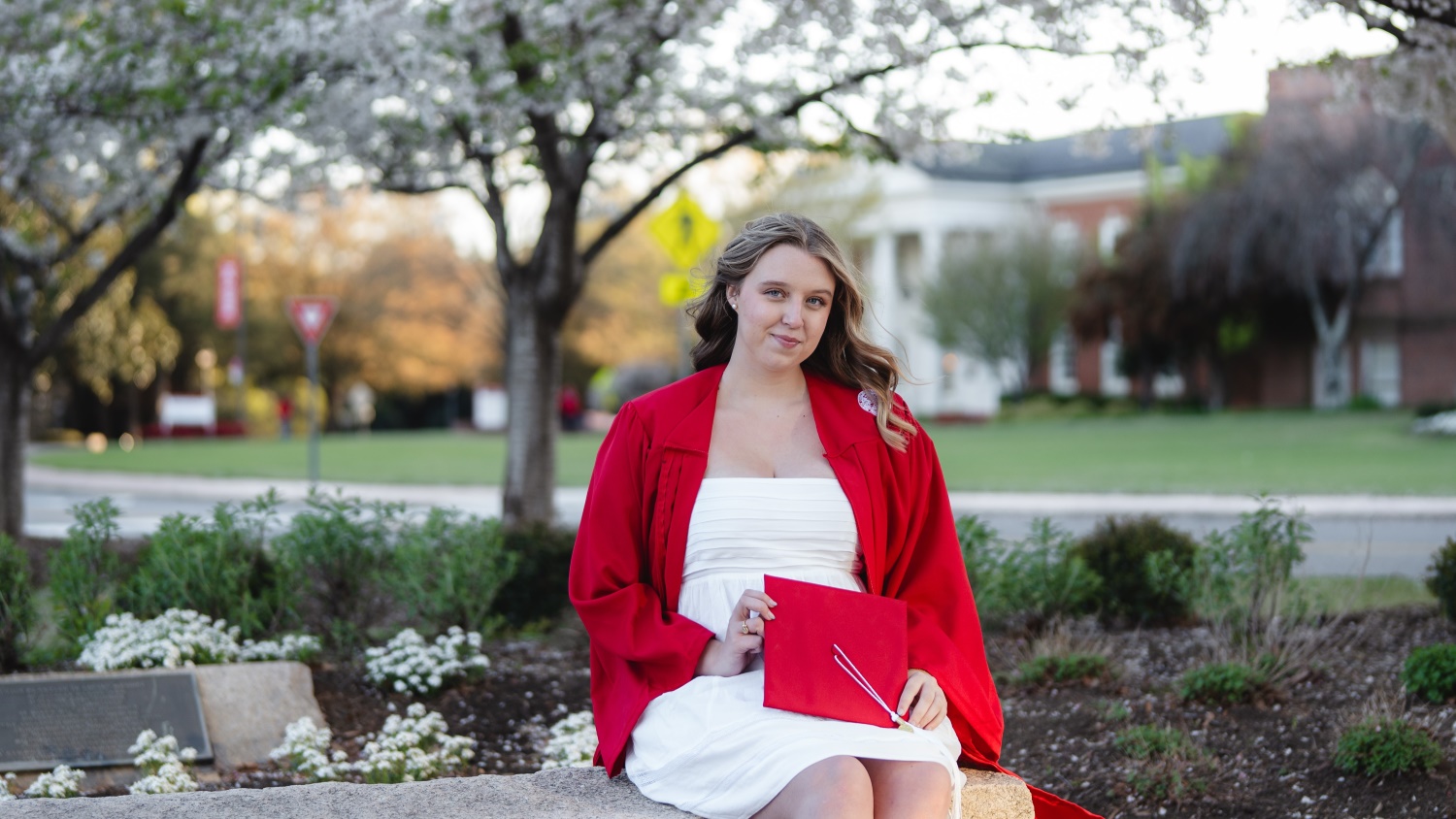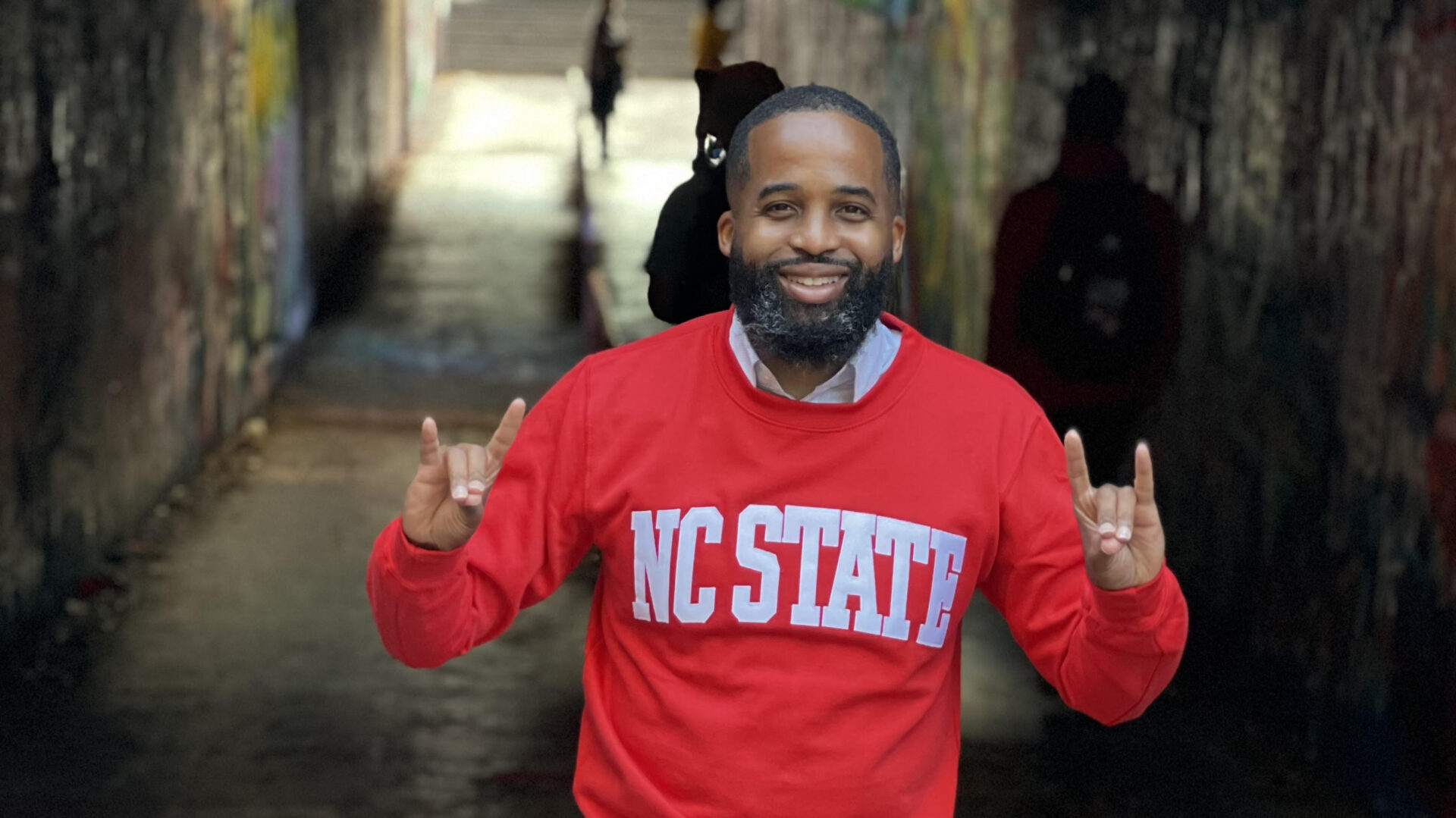Powered By Passion: How Staff at NC State’s TRIO Programs Make a Difference for Students

Each day, in offices on Raleigh’s National Drive and in the Park Shops building on NC State’s campus — and in schools across five counties — the 19 staff members who implement the university’s TRIO programs bring their expertise and passion to fulfilling a vital purpose: supporting hundreds of first-generation and financially under-resourced students as they prepare for college and helping them thrive once they get there.
TRIO programs — so named because they originally comprised three components, including Upward Bound, Talent Search and Student Support Services — receive funding under Title IV of the Higher Education Act of 1965 and were established to increase educational access.
Led by Courtney Simpson on the collegiate end and Maurice Mathis on the pre-college side, TRIO helps reduce the class, social and cultural barriers to higher education — similar to the way financial aid is intended to help overcome financial hurdles.
Though the programs are federally funded, donor support for TRIO can be vital to helping students navigate personal and financial challenges to stay on track to graduation. Many TRIO staff are in fact donors themselves.
Simpson explained that for many of the financially under-resourced students that TRIO serves, something that may seem simple can snowball into consequences, especially if they’ve already exhausted other university resources.
“We’ll hear a story where a student had an outstanding bill from health services. They had insurance, but they were charged extra for a lab test. It might be $50, but if a student doesn’t have it, they might delay registering for classes. Then they have to pay the late registration fee, and sometimes late registration means pre-paying for classes. So the student might take that as a sign to sit out for a semester and then go through the readmissions process,” Simpson said.
“However, if they talk to us, we can use our resources to help, rather than the student having to try to play catch up.”
The skills to help students cope with situations like this one can be taught.
“But you can’t teach passion,” Mathis said, “and every staff member who comes in has a passion for the work that we do, has a passion for the students we work with and has a passion for the overall mission of the TRIO programs.”
Living the Land-Grant Mission
While conversations around access and affordability in higher education have gained greater momentum in recent years, TRIO has been making a difference at NC State for decades. The university launched the Upward Bound program in 1978, then Talent Search in 1991 and Student Support Services in 2010. The first two programs serve students who are in middle or high school, while Student Support Services serves students enrolled at NC State. The university is also home to a fourth affiliated program, the Ronald E. McNair Scholars program, which is focused on students with an interest in pursuing a Ph.D.
The university’s TRIO programs are among more than 113 administered by higher education institutions, nonprofits and school systems in the state. In fact, Mathis, who serves as the state president for TRIO programs, noted that North Carolina has the fifth-most TRIO programs in the country. Location is the determining factor for whether students take part in pre-college programs at NC State or another university.
“We’re here, and we’ve been here,” Mathis said. “School systems and administrators know us, and so do the families and communities we serve. We see students apply to Talent Search or Upward Bound because their siblings or cousins went through the programs.”
Mathis explains that his team’s work with pre-college students is one of the ways the university fulfills its land-grant mission.
“Our core mission is to go out to the people in our communities and serve them. That’s exactly what TRIO pre-college programs are doing,” he said.
Upward Bound, which focuses on high-school students only, and Talent Search, which includes students in sixth through 12th grades, offer a variety of free programming, including academic support, tutoring, social enrichment, cultural enrichment, personal development, ACT and SAT preparation, college application assistance, fee waivers and college tours.
“We offer a lot of social and emotional development so students can be prepared for all the twists and turns when they go off to college and beyond,” Mathis said.
A $50 gift
can provide high school graduation regalia for a student
An $80 gift
can provide a college application fee waiver for a student
A $200 gift
can provide an enrollment fee waiver for a high school student
Most recently, in the wake of the COVID-19 pandemic, that development has included a focus on mental health. “We’re always going to be academically driven, but every program has an emphasis on social and emotional health now,” Mathis said, noting that many of the students enrolled in TRIO are from backgrounds where, culturally, conversations about mental health are less common.
That means TRIO programs can be a space where students can talk through their feelings and receive validation that it’s OK to have certain thoughts and to talk with someone about what they are experiencing.
While participants in NC State-based Upward Bound and Talent Search participants might not end up joining the Wolfpack, NC State plays a key role in providing opportunities for students to see themselves at a two- or four-year college.
And for those students who do choose NC State? Mathis gets a front-row seat to their journey.
He remembers a student who applied to Upward Bound freshman year but wasn’t academically ready at the time. The young man was adamant about participating and had a goal of eventually attending NC State, so Mathis outlined steps he could take to reapply the following year.
“He pushed and pushed to get into our program, then spent the next three years doing everything he could do to be at NC State. He began to see the university more and connect with its culture because he was with us two Saturdays a month and in the summer,” Mathis said.
“He got in, and [he did] study abroad, interned in New York and became a Caldwell Fellow — he’s done amazing, amazing things. And he graduated in May. I know the push we gave him and the opportunities he had with Upward Bound really helped him connect his desire to go to NC State with the reality of going — and graduating.”
Involved All the Way
Whether or not students participate in pre-college TRIO programs, once they are accepted to NC State, they can apply for Student Support Services (SSS) and SSS-STEM programs — and that’s where Simpson’s team comes in, serving about 280 students each year.
“We are their sounding board. We help address any questions our students may have about navigating NC State as a first-generation college student or as a student who may be limited in financial resources, and we advocate on their behalf as well,” Simpson said. “We’re here to be a space without judgment.”
SSS staff, many of whom were first-generation college graduates themselves, play an active role in students’ lives throughout their time at NC State. They help students with everything from navigating academics to taking a driving test, stocking a new residence with basic supplies or getting the proper laptop for classes. The NC State University Libraries’ technology lending program inspired TRIO’s own lending library.
A $50 gift
can support a student with emergency break housing for two nights
A $75 gift
can assist a student with access to necessary healthcare on campus
A $100 gift
can provide a student with a graduate school application fee waiver
“Some of what we help students with are things others might take for granted. Not everyone has access to certain things, and TRIO really does provide access to opportunities and information that helps students thrive,” Simpson said.
While SSS serves a limited number of students, the staff’s knowledge of the challenges facing first-generation and financially under-resourced scholars means they have a seat at the table advocating for all undergraduates who face similar situations.
TRIO has been able to collaborate with other groups on campus and contribute to broader discussions about meeting basic needs. Sarah Wright, assistant director of Student Support Services, serves as co-chair of the Pack Essentials Steering Committee and as a committee member for the NC State Student Emergency Housing Feasibility Study and Host Homes Program.
“That’s a shift we’ve seen over the years,” Simpson said. “We’re also working on behalf of students who we don’t see every day. We’ve been able to talk beyond our program about how we can get more first-generation and lower-income students included in what we define as the true NC State experience.”
More About TRIO
What TRIO programs exist at NC State?
NC State hosts Talent Search, Upward Bound, Student Support Services and the Ronald McNair Scholars program, which is intended to increase graduate degree awards for students from underrepresented segments of society. Each program is application -based, and interested students must meet income requirements based on federal guidelines, be a first-generation college student or be registered with the Disability Resource Office.
What is Upward Bound?
Upward Bound is an early intervention pre-college program that helps high-school students prepare for higher education. NC State’s program serves 180 students each year.
What is Talent Search?
TRIO Talent Search is a college access program for youth in grades six through 12. NC State’s program serves more than 1,000 students each year.
What is Student Support Services?
Student Support Services (SSS) and Student Support Services STEM (SSS-STEM) are college retention and completion programs that provide academic and personal development opportunities to 260 students at NC State each year.
What is McNair?
The Ronald E. McNair Scholars Program is designed to prepare undergraduate students for doctoral studies through involvement in research and other scholarly activities. McNair participants are either first-generation college students with financial need, or members of a group that is traditionally underrepresented in graduate education and have demonstrated strong academic potential. The goal of the Ronald E. McNair Post-baccalaureate Achievement Program is to increase graduate degree awards for students from underrepresented segments of society.
Studying abroad is one example Simpson cites as an activity NC State students are encouraged to undertake but one that can pose multiple barriers.
“We have a Think and Do philosophy, but sometimes it’s just not that easy to go out and do,” she said. “We know how valuable study abroad is, but not all of our students have that opportunity. So we can look at experiences like Alternative Service Breaks or speaking engagements with world-renowned experts so students can engage in that way too.”
While fostering a sense of belonging within NC State is one of Simpson’s priorities, her team is equally committed to building community within TRIO itself.
“It’s another way our work has shifted,” Simpson said. “In addition to the academic support piece, we also want to create a community for students who might not have had that outside of a Zoom box for a long time.”
Those activities range from one-pot cooking classes in Carmichael Gym through Wellness and Recreation to seeing a play together, and from developing academic plans based on Myers-Briggs profiles to tours of graduate schools — all designed to help students grow and thrive.
“We have some amazing students,” Simpson said. “They are hard workers — many are working two jobs to pay for their education. We want them to be able not just to work hard, but to work smart and be involved all the way, versus only here to take classes.”
A Far-Reaching Impact
Although TRIO’s pre-college and collegiate teams are housed in different parts of campus and work with different populations, when speaking with Mathis and Simpson, it’s clear they and their teams are driven by the same passion and care — and knowledge that every dollar can make a difference.
While a gift to TRIO technically supports a program, both Mathis and Simpson think of it as directly supporting a student, whether that’s by providing emergency resources or by opening doors that may otherwise stay shut.
That’s why many TRIO staff are annual and monthly donors to the programs.
“We know the impact of a $10 gift or a $100 gift, whether we give through payroll deduction, on Day of Giving or through other means,” Simpson said. “There’s a love and care and appreciation for our students, so if a gift helps one of them, then we know we’ve done our job to the best of our ability.”
Mathis hopes donors considering making a gift to TRIO programs know how far their support can really reach.
“No matter the amount, that gift could be the changing point in a student’s life in terms of finishing school or not finishing school. When you think about how much of a long-term impact that is, I think that really connects people to our mission,” he said. “Every dollar really can shape or reshape a student’s trajectory for college.”
And when that trajectory culminates in graduation, Simpson talks to those students she has seen grow over the years about the legacy they want to leave at NC State — the relationships they’ve built and the relationships they’ll have with the university as alumni — and the legacy of giving back they can create for future students.
“I want to thank our donors for giving back to such an amazing group of students who otherwise are making it happen on their own,” she said.
“Having that support from others shows our students that people really do care. It’s really rewarding to be in this space and see the impact donors have on a college journey.”
- Categories:


